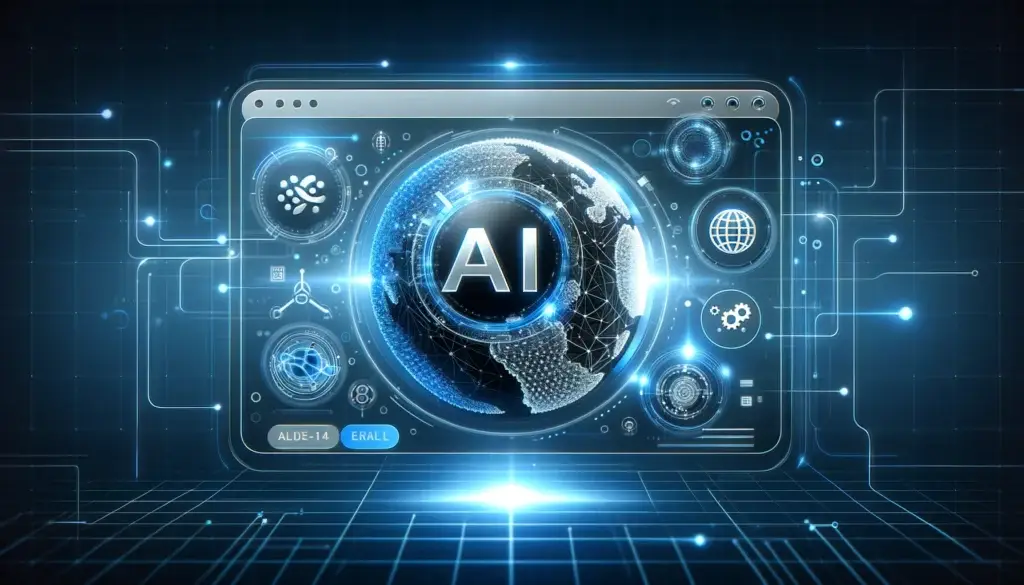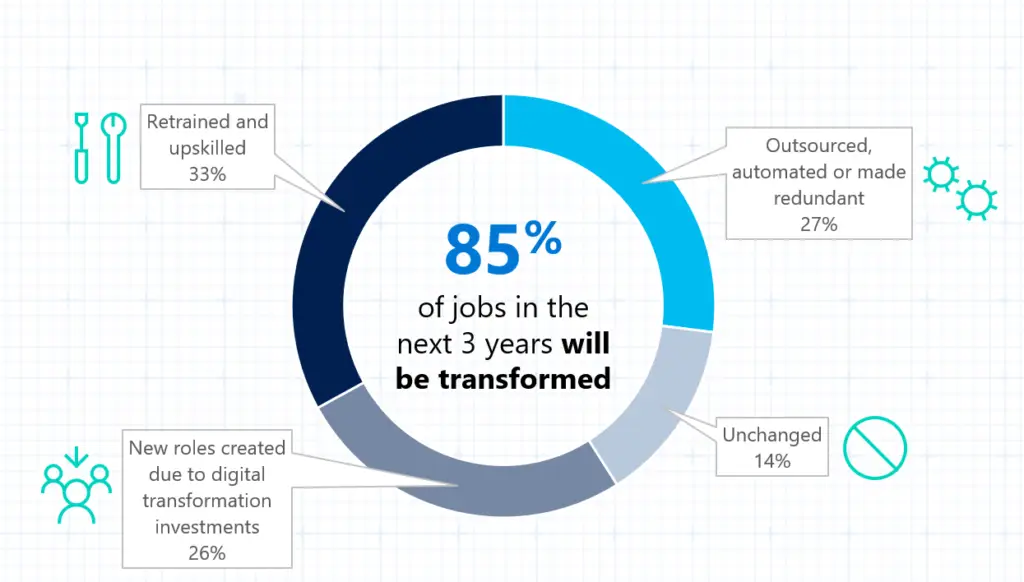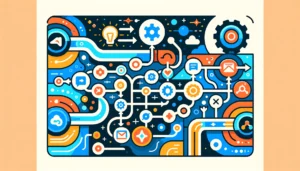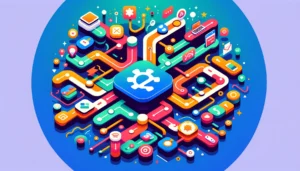Introduction
The advent of Artificial Intelligence (AI) marks a pivotal shift in the work landscape, profoundly altering how we approach our jobs and careers. In this comprehensive exploration, we delve into the multifaceted impact of AI, from automating routine tasks to creating new job opportunities, and the necessary evolution of skillsets. This three-part series aims to unravel the complex narrative around AI – examining its benefits, addressing the concerns it raises, and providing insights into effectively navigating this transformative era.
The Current Landscape of AI in the Workplace
The integration of AI into the workplace is a reality that’s constantly evolving, reshaping how businesses operate across various sectors. AI’s ability to automate tasks has already shown significant impacts:
- Manufacturing: AI-driven automation has revolutionized manufacturing processes, significantly enhancing efficiency. McKinsey reports an up to 20% increase in production efficiency in factories leveraging AI technologies.
- Finance: In the finance sector, AI algorithms are pivotal in fraud detection, with Forbes noting a remarkable 35% reduction in fraud cases through advanced AI pattern detection.
- Customer Service: The incorporation of AI chatbots in customer service is not only cost-effective, reducing costs by 30% as per IBM, but also maintains or enhances service quality.
- Healthcare: AI applications in healthcare, especially in diagnostics, have seen a surge in accuracy. Nature highlights that diagnostic accuracy has improved by up to 40%, leading to more effective treatment plans.
- Workforce Impact: While AI brings efficiency, it also raises concerns about job displacement. The Brookings Institution points out that 25% of jobs in certain sectors are at high risk of automation.
Navigating Skill Evolution and Workforce Adaptation
In an AI-augmented future, the workforce must adapt by developing a blend of traditional and novel skills:
- Technological Literacy: Fundamental understanding of AI and related technologies will be crucial for everyone, with advanced skills necessary for specialists.
- Critical Thinking and Problem Solving: As AI automates routine tasks, the ability to tackle complex problems becomes invaluable.
- Creativity and Innovation: Human creativity will be essential in driving innovation, as AI handles more analytical tasks.
- Emotional Intelligence: Professions requiring a human touch will increasingly value empathy and emotional intelligence.
- Adaptability and Flexibility: The rapidly evolving job landscape necessitates the ability to learn new skills and adapt to changing roles.
The Role Of Lifelong Learning Lifelong learning is key to navigating these changes. This includes:
- Formal Education Programs: Focused on emerging technologies and their applications.
- On-the-job Training and Professional Development: To continually update skills in line with current trends.
- Online Courses and Learning Platforms: Offering flexibility and accessibility.
- Employer-led Training Initiatives: To ensure the workforce remains skilled and up-to-date.
Ethical and Societal Implications of AI
As AI reshapes the workplace, its ethical and societal implications become increasingly important:
- Bias and Fairness: There’s a growing concern about biases within AI systems, especially those used in recruitment and performance evaluations.
- Transparency and Accountability: Understanding AI decision-making processes is essential for transparency and accountability, particularly in sectors where these decisions have significant impacts.
- Privacy and Data Security: With AI processing vast amounts of personal data, issues around privacy and security are paramount.
- Workplace Diversity and Inclusion: Ensuring AI does not perpetuate existing inequalities is vital.
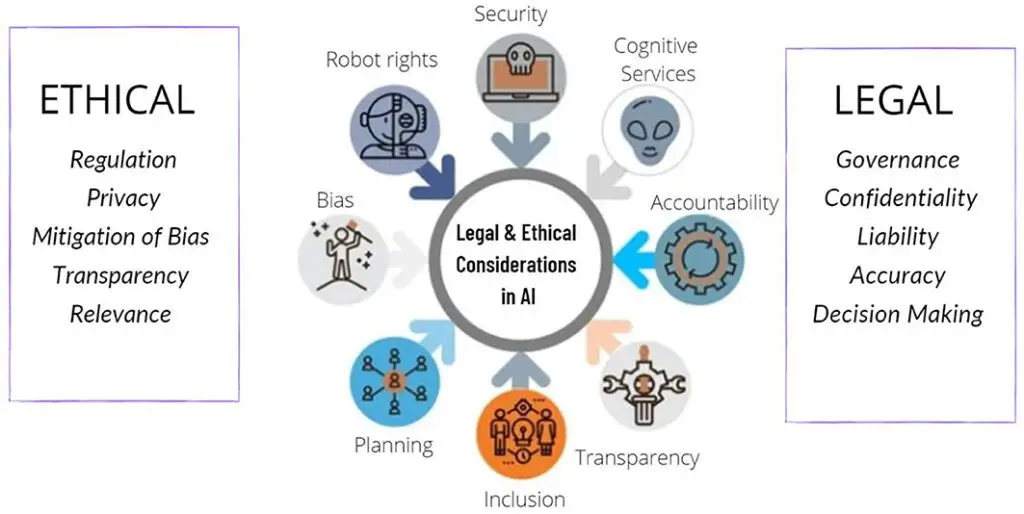
Leadership and Management in the AI Era
In an AI-driven world, leaders face new challenges and opportunities:
- Technical Proficiency: Leaders don’t need to be AI experts, but a foundational understanding is essential to foresee how AI can impact and enhance business processes and strategies.
- Adaptive Leadership: With rapid technological changes, leaders must cultivate an environment that embraces change, encouraging innovation and flexibility within their teams.
- Ethical Decision-Making: Leaders must navigate the complexities of AI ethics, ensuring that their AI implementations are fair, transparent, and do not infringe on privacy.
- Employee Development and Engagement: A key leadership role will be ensuring employees are equipped for the AI-augmented future. This includes not only technical training but also fostering skills such as creativity and critical thinking.
- Collaborative Work Environments: Encouraging collaboration between AI systems and human workers, leaders should foster a culture where AI is viewed as a tool for enhancement rather than replacement.
- Inclusivity in AI Development: Ensuring that AI development teams are diverse and inclusive to minimize biases in AI applications.
Future Trends and Predictions in AI
As we look ahead, the future of AI in the workplace holds fascinating possibilities:
- Advancements in Machine Learning: AI will continue to evolve, becoming more sophisticated in learning and problem-solving, impacting various sectors from healthcare to finance.
- AI and the Internet of Things (IoT): The integration of AI with IoT will lead to smarter work environments and more efficient business processes.
- Rise of Ethical AI: As awareness of AI’s societal impact grows, there will be a stronger focus on developing ethical AI frameworks.
- AI in Decision-Making: AI’s role in strategic decision-making will expand, providing businesses with deeper insights and foresight.
Conclusion
The integration of AI into the workplace is transforming the landscape of work, bringing both challenges and opportunities. As we navigate this AI revolution, it’s imperative to adapt and prepare for its impact on jobs, skill requirements, and ethical considerations.
Embracing AI means not just leveraging its technological capabilities but also fostering a workplace that is adaptable, ethical, and inclusive. By understanding AI’s multifaceted impact, we can harness its potential to enhance productivity, foster innovation, and create a dynamic and resilient workforce.

